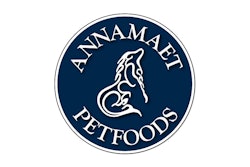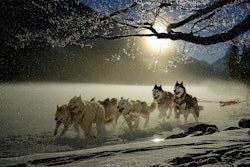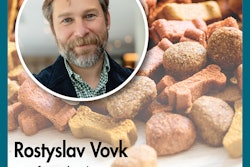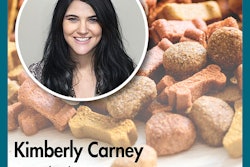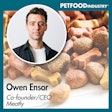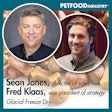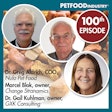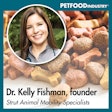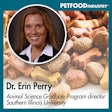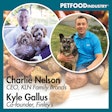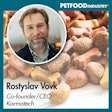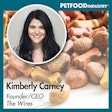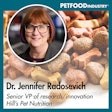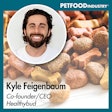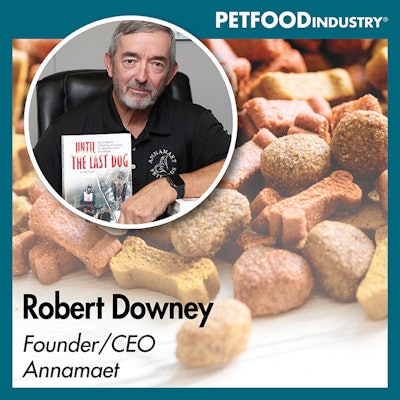
In this episode of Trending: Pet Food, Lindsay Beaton speaks with Robert Downey, founder and CEO of Annamaet, about how the pet food industry has evolved over the past 35 years. Downey discusses how pet humanization has driven increased demand for transparency and higher nutritional standards, moving the industry away from seeking minimum requirements to providing optimal nutrition. He shares insights from his book "Until the Last Dog," which chronicles his journey from sled dog racing to building a family-owned pet food company focused on science-based nutrition. The conversation also covers challenges facing the industry, including the rise of unsubstantiated supplement claims and the impact of investment firms acquiring family-run pet food companies.
We want to thank AFB International for sponsoring this podcast. AFB is the premier supplier of palatants to pet food companies worldwide, offering off the shelf and custom solutions and services that make pet food treats and supplements taste great.
Lindsay Beaton, editor, Petfood Industry magazine and host, Trending: Pet Food podcast: Hello, and welcome to Trending: Pet Food, the industry podcast where we cover all the latest hot topics and trends in pet food. I'm your host and editor of Petfood Industry magazine Lindsay Beaton, and I'm here today with Robert Downey, founder and CEO of Annamaet as well as author of the book "Until the Last Dog." Hi Rob, and welcome!
Robert Downey, founder and CEO of Annamaet: Thanks. I'm honored to be here. I'm looking forward to it.
Beaton: In case you're unfamiliar with Rob or Annamaet, here's what you need to know. Rob Downey's lifelong involvement with dogs led to his career as a companion animal nutritionist. Downey has traveled the world giving lectures, and his research has been published in several peer-reviewed veterinary and nutrition journals. His first book, "Until The Last Dog," follows the path of his life story, from early childhood trauma to competing in sled dog sports for close to 40 years, including twenty winters in Alaska.
Annamaet Petfoods Inc., a family owned and operated company, has been providing optimum nutrition to dogs and cats for over 35 years. Located in Hatfield, Pennsylvania, Annamaet currently ships products throughout the United States as well as exports to 15 countries. The company's mission is to maximize the health and well-being of pets while preserving the environment and natural resources for future generations. Downey's lifelong interest in and knowledge of animal nutrition, as well as his book, are why I've brought him on today to answer this question: How have pet food and nutrition evolved since you first got involved with them?
Rob, I aim to cover a lot of ground today. I've read your book and thoroughly enjoyed it. I am definitely enjoying the opportunity to speak to an author, but most of the industry knows you as the CEO of Annamaet. I want to start first by talking about how you've seen the pet food industry evolve since you launched your company, and how have you evolved alongside it.
Downey: Thanks, Lindsay, it's really fun to be here. I honestly think that the evolution of the pet food industry since I started really goes back to the humanization of pets. It wasn't that long ago that most people didn't care how long their dogs lived, stool quality, coat quality. Now, with the humanization of pets, we have over 90% of the pet owners that now consider their pets to be an essential part of the family, just like their children. They're demanding answers. They're demanding transparency, and they've raised the bar.
One of the perfect examples is something as simple as vitamin supplements. In the last 15 years, vitamin supplementation in pet foods has gone up about 30%. If you go back to when I first started, companies were spending millions of dollars to see how low they could go before they saw clinical deficiency. We've come a long way, and I think a big part of that is just the consumer that's much more into their pets. As far as how we've evolved with that, that really fits our mission. That's what we've been about since we started. My passion for dogs. I was born and raised with dogs. All I've ever wanted to do is work with dogs. Frankly, I think I get along with dogs better than I do with people. That's always been part of it. I think the pet owners are finding companies like Annamaet because they do care.
Beaton: Nutrition has always been your focus from when you launched Annamaet and even before. Your story delves into that and why you wanted a nutrition forward company to begin with. Looking back now, do you feel like you were ahead of the game and the rest of the industry is catching up to you, or have you also evolved nutritionally in that time, or added things that you didn't have when you started out?
Downey: I actually think we've been ahead of the curve since we started and part of that goes back to my early career as a graduate student. We published some work that showed that you could increase stamina by 30% by altering protein, fats and carbohydrates. When I was racing sled dogs at the time, there was no dry food you could do that with. We virtually had to feed raw meat for dogs to be competitive. I didn't understand that. When I started Annamaet, I started to realize the true differences — quality of ingredients, how long you process it — that kind of stuff that really can affect bioavailability and digestibility.
Beaton: You covered this in your book, but for people who haven't read the book, what was it about sled dog racing and working with your dogs that led you to go, you know what? This is more than just feeding my animals. I want all animals to have access to this kind of performance nutrition. What was the tipping point from just taking care of your own animals to going, you know what? I think I can make something bigger out of this?
Downey: That's a good question. Actually, my "aha moment" was I started college in northern Minnesota. I was born and raised with dogs, as I mentioned. There's nothing to do for me in northern Minnesota in the winter. I went to a sled dog race, and I thought, wow, this is neat. I was hooked. I started to accumulate rescue sled dogs. There were castoffs, and I was training them. Within a year, I was beating some of the people that had given me the dogs in the beginning, which didn't go over very well. Some of them didn't appreciate that. Some of them didn't want to believe it was the same dog they had given me.
One day, one of my lead dogs, her name was Heidi, was really stiff in the hind end coming out of her doghouse, and the next day was even worse. Of course, it was concerning. I rushed her to the vet, and after extensive testing, they deemed her to be selenium deficient. Selenium is an essential mineral that we all need, dogs or humans. I changed her diet, and not only did she get better, but the whole dog team got better. I thought, wow, this is what I want to do. I want to study nutrition the rest of my life.
The funny thing about it is that now 40 years later, I can tell you that it was a misdiagnosis. She wasn't selenium deficient. Actually, it was more like rhabdomyolysis, which is a breakdown of the muscles. Honestly, if she'd been correctly diagnosed, I would have probably just given her two weeks off, not changed the diet. She would have got better, and I wouldn't have studied nutrition. I wouldn't be here with you.
Beaton: Your book is about your life, but Annamaet is such a big part of it, and how it came to be and how you have evolved alongside the company that talking about the two of them is a little bit interchangeable after a certain point in your career. What made you decide to write a book about your life and include Annamaet? Do you feel like you were writing more of a book about your life, or about how Annamaet came to be?
Downey: The push for the book, honestly, was one of my sisters lived vicariously through my travels, and I'm fortunate enough that I was able to travel all over the world with my dogs, whether it be the Pyrenees Mountains of Spain or the southern tip of Argentina. Of course, the best part was racing in Alaska, but she lived vicariously through my travels, and she kept saying, you got to write a book. You got to write a book. Unfortunately, she got sick, and before she passed away, one last thing she said to me was, you have to promise to write the book. Of course, then I had no choice.
The book really describes my life, but it also shows how it led me to starting Annamaet and why we're different than a lot of other pet food companies. After graduate school, I consulted for a few different pet food companies, and it never really worked out, because you'd make a recommendation based on the sound nutritional principle. Unless it improved the bottom line, they weren't interested. My friends kept saying, why don't you start your own company? That's eventually what we did.
Beaton: It sounds like some of the big decisions in your life, and the big successes happened because you had the right people around you speaking into your ear until you finally made the decision to do the thing. I know Annamaet is now a multi-generational, family owned company. How have family and friends influenced your life path, whether it's writing the book or running the company or the future of the company? How important has having the right people around you been?
Downey: It's been absolutely everything. When I was an undergraduate at The Ohio State University, I had an advisor, Dr. Tisnic, who was a big nutritionist, and he let me do independent study with my sled dogs. He saw how I was into it, and then he connected me with Dr. David Kronfeld at the University of Pennsylvania, School of Veterinary Medicine. He actually brought him out to Ohio State to do a lecture so he could meet me. Dr. Kronfeld was looking for a graduate student at the time, and he thought I would be really a good candidate, because he said he was looking at people that were either absolutely totally into dogs or they were complete brainiacs. He said I was the compromise candidate, because I was really good with dogs, but I knew my way around the lab. That's how it started. We went out there to do basically an eight-week study, and stayed for seven years and published all this work.
Then, of course, my wife, who, if you read the book, I honestly think she's the star of the book. She's been with me every step of the way. She's a co-creator, and she was actually the one — the company is called Annamaet, but it's named after my mom. Her name was Anna Mae, and it was actually my wife, Mary Jo that came up with the idea to name it after my mom. I've been blessed.
Beaton: Was there ever a point in your life where you thought you would be doing something different, or considered doing something different? It seems like you've been all in on nutrition and pets for a long, long time, and from an early point where people are making these decisions in your careers. Was this always what was going to happen?
Downey: No, not at all. When I first went away to college in northern Minnesota, my dad was a lawyer. My uncle was a lawyer. I was going to study pre-law. I'd have been the worst lawyer in the world. I am not confrontational. I'm not argumentative, I would have been horrible. How fortuitous it was that I went to a sled dog race, and I thought, wow, I want to work with dogs. I've always wanted to work with dogs, and this just gave me the path. Then we just followed the passion by getting involved in nutrition and staying with it. It's been tremendously hard work, but when you believe in something, it's not that hard.
Beaton: It's interesting that you say that you followed the passion, because many times I interview or speak to business owners who either had careers before pet food or never thought they would end up here. A lot of the industry is built on people who just had a passion. I don't think it's unique to the pet food industry, but I think it's very prevalent in this industry, because just about everybody has pets, and everybody has been touched in a positive way by their pets. I think it really can bring the passion out in people and cause them to do what you did, to start a company to work with animals in some way, to race sled dogs. How has your passion driven you in your life, and then how does it continue to affect how you do business at Annamaet?
Downey: I think that you hit it right on the head. People that have pets, they're around them 24/7, right? It's easy to have that passion. It's not like you're leaving it at the office and coming home. The pets are always with you. That drives that passion. It's just been part of my life. I can't imagine doing anything else than working with animals. That's how I met my wife at the vet school at Penn, and she was an animal lover as well. Now we have two kids that were raised with animals, and they've done sled dog racing. It's really a family sojourn.
Beaton: When you were writing the book, obviously, you had to dig deep into your past, into your life, and figure out what stories to tell. As you were writing those stories down, did anything provide any insight that you had never really thought about before, about why you do what you do? Were there any "aha moments" for you about your own life and how you got to where you are?
Downey: One of the interesting parts of it was that being a scientist, I've kept a journal, and I've kept a journal of every year since I was a graduate student. When I finally decided that I had to write the book, I started to read all those journals, and I read every one. Honestly, some parts of it were rather emotional. Mary Jo occasionally in the journal, would write a thing called Reflections, and she would just talk about our life, beautifully written about our life at that time. That opened up thoughts. Then one of the things I had to address, I couldn't write this book without addressing some early childhood trauma. I had to work through that. That certainly wasn't easy either. That made it a little more difficult.
One of the things I was most amazed about was when I got done, I totaled everything up. I've been on the back of the dog team over 6,000 times in my life, and I've covered over 42,000 miles, which is almost twice the circumference of the planet. Even I was surprised about that.
Beaton: That's incredible. Is there anything that you had to cut from the book that you wish you had been able to keep in? Now that the book's been out for a little bit, you start to think about it and wonder about the editing.
Downey: The funny thing is, my friends are reading the book. They're saying, well, what about the time when this happened? I'm thinking, oh, my God. I didn't even think to put that in. There's many stories that I didn't put in.
Interestingly, when I started to write it, I'm looking how many words it should be, and I'm thinking, I'm never going to get there. Early on, I'm writing and I'm going into these flowing things. It was a beautiful sunny day with high cumulus clouds, and I'm taking forever to tell a story. All of a sudden I realized I've blown past how many words I'm supposed to be. Then I had to go back and start chopping out sections and cutting back so that I could fit it all. It was an interesting concept in doing it, what to put in and what to leave out. I like to tell people that I changed the names to protect the guilty.
Beaton: A very common writer's tactic. Back to the industry. How have you seen Annamaet's place in it evolve over the years? You say you've always been ahead of the game, but now there are subsets of the industry and categories that didn't necessarily exist when you first started. There's been an overall trend towards more premium products, and now there's fresh and raw and freeze dried and air dried and all these other options. How has Annamaet ridden the waves of the expansion of the industry over the years?
Downey: I think one of the biggest things is our focus on nutrition and science. I'm a companion animal nutritionist. We also have on staff a board certified veterinary nutritionist. We've been producing cutting edge new formulas for the longest time. In fact, many therapeutic diets that help with obesity, help with sensitive skin, senior formulas. Between the two of us, we have over 150 publications in peer-reviewed journals or chapters in books. There's a lot of science behind what we do, and we also do a lot of supplements that have been tremendously received.
One of the things is a lot of people are doing home prepared formulas, and I give a lot of lectures, and inevitably, somebody will come up to me afterwards and say, well, I don't feed commercial dog food. I make my own. I say, well, what do you do for vitamins and minerals? I get this blank look on their face. We actually put together a vitamin mineral package strictly to use for home-prepared. It was amazing to me. We introduced that at a veterinary conference and the vets loved it, because many vets are being asked to balance and they're not necessarily trained in nutrition. Within two years, some months, that's our biggest selling SKU for that month. We're not just strictly dog and cat food, we're doing a lot of supplements and treats.
Beaton: What do you think about the current growth of the supplement space, because it is pretty significant? It's gone from the typical maybe everybody used to look for a joint supplement or specialized formula for obesity, but now it's everything from calming to brain health to multivitamins like humans take that handle overall lifespan when there's nothing acute happening at all. What do you think of all of that that's going on right now? How do you think it's going to shake out?
Downey: A lot of it is concerning to me, because quite honestly, there's not a lot of science behind a lot of these products I see. What happens is a lot of companies want to have the shiny new product. They're not necessarily even bothering testing these. They're trying to be the first one on the shelves. You see that a lot with joint supplements. Frankly, we found with joint supplements with our sled dogs, well, we make one, not only did it have less injuries during the season, they lasted longer at the end of their careers. The problem is joint supplements. There's millions of them out there, and some of them are just poor quality. They don't work. Somebody tries it and they figure, well, none of them work. That's a concern I have.
Honestly, there's a lot of people that are portraying themselves as experts with really no training, and they're producing products with no science background or no peer-reviewed journal testing. That's a concern I have, but honestly, most of them, the ingredients in there, are such minor — you're probably not going to hurt an animal. You're just wasting your money trying to help them.
Beaton: How do you help educate your customers and the retailers who sell your products so that they can explain the science, or at least help people find the science and the research that you've published and things like that? What are people asking for education on and then what has been the most useful for you?
Downey: As a company, we actually do a lot of training videos, and we'll go into retail stores, and a lot of times they'll set up and invite customers in. We'll go in in the evening and do a lecture about not Annamaet but typically we name it, "Transparency in the Pet Industry" or "Myths of the Pet Food Industry" to say this is what you need to watch out for. Be careful. This might not be accurate. Those have gone over tremendously. Then we do podcasts, and then we even have some of these on our website, so people can go to annmaet.com and listen to them. I'm not sure that it's funny, I do events and sales reps from other companies will come up to me and thank me because they said they learned all their nutrition from one of my podcasts.
Beaton: Nutrition is obviously a constant focus of the industry, and you mentioned the part where veterinarians don't necessarily have that nutrition education, because it's not a huge focus. In veterinary school, they take one or two classes and then, if their continuing education doesn't include that, they might fall behind. Do you guys work with veterinarians as well to try to bring them up to speed?
Downey: Tremendously. I'm not blaming veterinarians. Let's face it, less than half the teaching veterinary schools in the US have a core nutrition course. Think about it. They have to learn small animal, large animal, surgery, internal medicine, exotics — they don't have time to learn nutrition. I tell people, you don't go to your human doctor for nutritional advice. Why do you think you should go to your veterinarian? We work with a lot of vets trying to help them and their staffs just learn some basics about nutrition. Unfortunately, a lot of veterinarians, the most nutrition they get are from some of the big kibble companies that actually have people that go around and lecture at the vet schools. It's a little biased. It does give them some nutritional knowledge, but I'm afraid it's probably a little biased towards one company or another.
Beaton: What do you think is the future of the pet food industry? It's obviously changed a lot in the last 35 years, and there's much going on right now that it can be hard to see what might be coming next. What do you think is coming next and what the next big focus is going to be in the industry?
Downey: I'm actually optimistic about the pet food industry, and really for two reasons. First off, in getting back to this, is the pet parent. They're now into their pets and the health and well-being of their pets that they're doing a deep dive into the ingredients and the quality of the ingredients. One of the things that we do well is customer service. It's amazing. Some of the questions we get how deep they are into nutrition. I think they're pushing the industry to get better. Number one. Number two is the research that's been involved. There's been a lot of research that now shows that obesity is the number one problem facing pets, just like it is humans. A leaner dog and cat's gonna live longer, and you can cut two years off their lifespan.
We're also, let's face it, pets are living longer and longer. We're starting to see some geriatric maladies that we didn't used to see because, frankly, they didn't live that long. Now there's some good research in humans that proper vitamin levels can enhance the health and well-being of humans. Now some of that work's being done in pets too. I think that the research is helping as well.
The difficult part is that the pet industry is different from, say, poultry industry, beef, dairy. They all have associations that provide money for research. Most of the research done in the pet industry is done by private companies that might not necessarily be willing to share that data. We have a group of board certified veterinary nutritionists in this country that are doing their best to make people aware of what's going on and doing some really good cutting edge research. I think that bodes well for the pet food industry.
The one concern I do have is that there's much stuff being posted that just is inaccurate, and people are selling this or selling that with no background. That's a concern I have, that people are trying to do things as natural as possible. I agree with that, but there's a point of diminishing returns. Is that really that much healthier or healthy at all?
Beaton: How do you think the industry can work with that? In every industry, there's a certain amount of giving the customer what they want, as long as it's not going to harm the animal, but it might not necessarily benefit the animal either, just sort of walking that line. It's easy for anyone to communicate with potential customers, and the information is not always correct. How are they supposed to know the difference? How do you deal with it as a company? Then, what do you think the industry could possibly do about any of that?
Downey: I'm not sure what the industry can do, because there's many varied factors in it and different companies and everything. We've always just tried to maintain an integrity and transparency in what we do and provide the studies if people are interested. That's really all we can do from our aspect. I think honestly, people are trying to find out the truth, and if they look hard enough, they will find it. There's snake oil salesmen in every industry, and that's what you really have to wade through. I think eventually the truth comes out.
Beaton: As we wrap things up, my final question to you is, what's next for you? You have another book in you?
Downey: No, my wife said I'm one and done. Honestly, I didn't realize the easiest part of writing the book was actually writing the book. It's all the promotion and the interviews and everything you have to do afterwards and the traveling to promote it. That's a difficult part. I don't know what's in the cards for me. I do know that I'm in a good position with Annamaet, because we have the second generation firmly implanted. That's one of the things that I think has happened in the industry, is that 2008 when we had the great recession, everybody learned that the pet food industry is recession proof. People are going to cut their budgets on a lot of things before they touch their pets.
What we've seen now is a lot of good family run companies are now being bought up by venture capital or investment. I used to tell people that I used to be inundated with ingredient suppliers trying to sell us ingredients. Now it's venture capital firms that are trying to buy us. That's not an issue for us, because we have the second generation and our sales continue to grow. Why would I sell it? The problem is these companies that do get sold, you start to question what the intent now is, right? They're looking at costs over nutrition.
Perfect example is I had a colleague that was selling vitamins and minerals in the pet industry, and used to work with a family run business. When he would bid on it for each vitamin, he'd have to list country of origin, level of purity, any recalls, any preservatives, the whole list of questions for each one. That company gets bought by investment firm. The next year it goes back. They have one line — price. They don't want to know anything but price. He retired. He said, I can't deal with this. That's a concern I have.
One of the things I like about being a family run company is I don't have to answer to anybody, and I make the decisions right or wrong. It's a group effort here, and we don't have to listen to what others say.
Beaton: Were your kids always going to be involved in the business? Were they always interested in that, being raised around animals and raised around the business?
Downey: They were really into animals. My daughter, she's older than my son. It's kind of interesting. When she was going through high school, she was trying to decide whether she wanted to be a veterinarian or a physical therapist. All of my friends are veterinarians told her to go into physical therapy. That's what she did, but she missed being part of the family business. Now she's backed off physical therapy and does the head of our marketing, whereas my son, he's been thinking about the business forever, went to college and has been in every aspect of the business, from making samples to doing deliveries to recently spoke in Korea at Global Pet Expo. Somebody said, how long have you been in the business? He said, since I was old enough to hold a poop shovel.
Even my son-in-law, who's a CPA, he's our CFO, and he does a tremendous job, because he wears many hats. It really is a truly family business. I enjoy coming to work because you're with your family. The only bad thing is you never get away from it. Every family dinner turns into talk about business. I think it probably speaks well of the business you've built that your children want to be involved and didn't go you know what? Absolutely not. I'm gonna get as far away from this as I can.
Beaton: Does being a family business inform the culture of the business, like how your employees work with you, and things like that? Does it all sort of bleed into a culture of family owned business?
Downey: Yes, we take care of each other and we take care of pets. This is what we do. Absolutely everybody that works here has pets. There's family, mother-daughter, there's usually at least two, sometimes up to four, dogs here every day. The kids grew up with it. The kids were raising sled dogs when they were four and five years old, and my daughter, I'll never forget, used to drive me crazy. We'd have a litter of sled dog puppies. She was dressing them up in dog clothes and pushing them in a buggy, and it drives me crazy. Mary Jo would always say, well, that'll help socialize them, and certainly it did. These kids have been blessed to live a life where dogs were such a part of it. They raced in World Championships. It's a natural evolution now, to come into the business, and they're doing an amazing job. I mean, I couldn't be any prouder of them.
It's funny how the roles have changed. Early on, when my son and I would travel for business, I would be the one saying, okay, we need to do this, this and this. Now, as we get older and I'm older, he's the one that says, Dad, okay, let's go to the — I sort of follow him through the airports. It's been a great evolution.
Beaton: Well, thank you much for coming on and speaking to me today. I knew once I read your book that I wanted to have you on the podcast, because you are such a great storyteller, and just the way you have woven your life in with the company, without either one dominating the other, is really a life accomplishment as well. Kudos on managing a business and getting that sorted. Really it sounds like living out a lot of your dreams. Not everybody gets to do that, and you have found a way. Congratulations on doing that.
Downey: Thank you. Thank you much for having me, Lindsay, it's been such a pleasure, really.
Beaton: Before we go, I always do a plug for my guests. Where can people find more information about you and Annamaet and where can they get your book?
Downey: We have a website, obviously, Annamaet — annamaet.com, and we have a lot of information on there about our background, the nutrition background. There's even some videos on there. I recently did a podcast with Dax Shepard that's on the website. As far as the book, the book is titled "Until the Last Dog." That's a pretty good story in itself. One of the big stories in the book is that I was stomped and left for dead by a moose in Alaska, and my dogs literally saved my life. That story is worth reading. You can actually order the book from our website, or, of course, you can order it through Amazon or any of the other online booksellers.
Beaton: Perfect. That's it for this episode of Trending: Pet Food. You can find us on petfoodindustry.com, SoundCloud or your favorite podcast platform. You can also follow us on Instagram @trendingpetfoodpodcast. If you want to chat or have any feedback I'd love to hear from you, feel free to drop me an email [email protected].
Of course, thanks again to our sponsor, AFB International, the premier supplier of palatants to pet food companies worldwide, offering off-the-shelf and custom solutions and services that make pet food, treats and supplements taste great.
Once again, I'm Lindsay Beaton, your host and editor of Petfood Industry magazine, and we'll talk to you next time. Thanks for tuning in!



